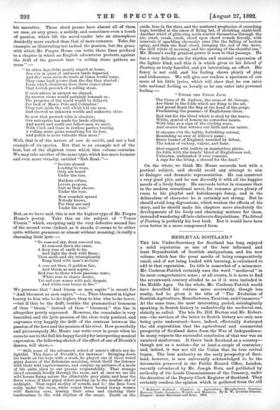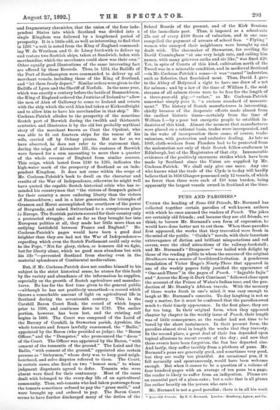MEDDEVAL SCOTLAND.*
THE late Under-Secretary for Scotland has long enjoyed a solid reputation as one of the best informed and least Dryasdustish of Scottish antiquarians, and his new volume, which has the great merits of being comparatively small, and of not being loaded with learning, is calculated to add to that reputation. Its title is somewhat of a misnomer. Mr. Cochran-Patrick certainly uses the word " medimval " in its most comprehensive sense ; at all events, it is news to find the seventeenth century alluded to as if it were included in the Middle Ages. On the whole, Mr. Cochran-Patrick would have described his volume more accurately, though less neatly, had he given it the title of The Evolution of Scottish Agriculture, Manufactures, Taxation, and Commerce." At the same time, the most interesting period, sociologically speaking, in Scotch history is undoubtedly the medimval one, strictly so called. The late Dr. Hill Burton-and Mr. Robert- son—the services of the latter to Scotch history are only now being quite understood—have, indeed, effectually destroyed the old superstition that the agricultural and commercial prosperity of Scotland dates from the War of Independence. In many respects the successful conclusion of that war was an unmixed misfortune. It threw back Scotland as a country— though not as a nation—for at least a couple of centuries ; and, indeed, it was not till the Union that its true revival began. The best authority on the early prosperity of Scot- land, however, is now universally acknowledged to be the documents preserved in the Public Record Office, London, recently calendared by Mr. Joseph Bain, and published by authority of the Lords Commissioners of the Treasury, under the direction of the Deputy-Clerk Register of Scotland. They certainly confirm the opinion which is gathered from the old • Hedizval Scotland : Chapters on Agriculture, Manufactures, Taxation, Eevesue, Trade, Commerce, Wetghts and Measurer. By R. W. Cochran-Patrick. Glasgow : James Blaelehose and Bons. 1892. and fragmentary chronicles, that the union of the four inde- pendent States into which Scotland was divided into a single Kingdom was followed by a lengthened period of -prosperity. It is a little odd, as well as interesting, to find that in 1205 "a writ is noted from the King of England command- ing W. de Wrotham and G. de Limy forthwith to deliver up and restore two Scottish ships, taken at Sandwich, laden with merchandise, which the merchants could show was their own." Other equally good illustrations of the same interesting fact are offered by these Records. Thus, in 1214, the Bailiffs of the Port of Southampton were commanded to deliver up all merchant vessels, including those of the King of Scotland, and "let them freely depart." Similar orders were given to the Bailiffs of Lynn and the Sheriff of Norfolk. In the same year, which was exactly a century before the battle of Bannockburn, the King of England ordered the Jnsticiar of Ireland to "allow the men of Alan of Galloway to come to Ireland and return with the ship which the said Alan had taken at Kirkcudbright and to allow him to have his merchandise in that ship." Mr. Cochran-Patrick alludes to the prosperity of the sometime Scotch port of Berwick during the twelfth and thirteenth centuries, and illustrates it by the old but probably mythical story of the merchant known as Cnut the Opulent, who was able to fit out fourteen ships for the rescue of his wife, carried off by Orkney pirates. But so far as we have observed, he does not refer to the statement that, during the reign of Alexander III., the customs of Berwick were farmed for a sum amounting to more than a quarter of the whole revenue of England from similar sources. This reign, which lasted from 1249 to 1285, indicates the high-water mark of the prosperity of Scotland as an inde- pendent Kingdom. It does not come within the scope of Mr. Cochran-Patrick's book to dwell on the character and results of the War of Independence, otherwise he might well have quoted the capable Scotch historical critic who has re- minded his countrymen that "the victors of Sempach gained for their country a more enduring liberty than the victors of Bannockburn; and in a later generation, the triumphs of Granson and Morat accomplished the overthrow of the power of Burgundy, and raised Switzerland to a conspicuous place in Europe. The Scottish patriots secured for their country only a protracted struggle ; and so far as they brought her into European politics at all, they made her little more than an -outlying battlefield between France and England." Mr. Cochran-Patrick's pages would have been a good deal brighter than they are had not the War of Independence— regarding which even the Scotch Parliament could only write to the Pope, "Not for glory, riches, or honours did we fight, but for liberty alone, which no good man abandons but with his life "—prevented Scotland from sharing even in the material splendours of Continental medimvalism.
But, if Mr. Cochran-Patrick does not confine himself to his subject in the strict historical sense, he atones for this fault' by the variety and abundance of the information he supplies, -especially on the growth of Scotch agriculture and manufac- tures. He has for the first time given to the general public —although he has not positively unearthed—a record which throws a remarkable amount of light on agricultural life in Scotland during the seventeenth century. This is the Corshill Baron Court Book, the record of which began prior to 1590, and continues down to 1719. The earlier portion, however, has been lost, and the existing roll begins in 1666. The Court was composed of the Laird of the Barony of Omaha in Stewarton parish, Ayrshire, the -whole tenants and fenars lawfully summoned, the "Bailie," appointed by the Baron (who presided as judge), the "Baron Officer," and the "Dempster," who pronounced the " doom " of the Court. The Officer was appointed by the Baron, "with consent of the tennentis of the ground." The Laird and the Bailie, "with consent of the ground," appointed also certain persons as " birleymen," whose duty was to keep good neigh- bourhood, and solve disputes referred to them. The Court, in certain cases, also fixed on two "honest men," to whose judgment disputants agreed to defer. Tenants who were absent were fined for their contumacy. Most of the cases dealt with belonged to the every-day life of an agricultural community. Thus, sub-tenants who had taken pasturage from the tenants sometimes refused to pay the "grass mail," and were brought up and ordered to pay. The Baron Court seems to have further discharged many of the duties of the
School Boards of the present, and of the Kirk Sessions of the immediate past. Thus, it imposed as a school-rate 22s. out of every 2100 Scots of valuation, and in one case compelled the payment of arrears of school fees. " Flyting " women who annoyed their neighbours were brought up and dealt with. The shoemaker of Stewarton, for reviling Sir David Cunningham "at ane very heigh rate, and calling him names, with many grievous oaths and sic like," was fined 220. Yet, in spite of Courts of this kind, cultivation north of the Tweed was in a miserable condition, and in mediteval Scotland —in Mr. Cochran-Patrick's sense—it was "casual "industries, such as fisheries, that flourished most. Thus, David I. gave to the Abbey of Holyrood a right to have one draw of a net for salmon ; and by a law of the time of William I., the mid- streams of all salmon rivers were to be free for the length of a three-year-old pig,—" rather," as Mr. Cochran-Patrick somewhat simply puts it, "a curious standard of measure- ment." The history of Scotch manufactures is interesting, chiefly because of the desperate efforts made almost from the earliest historic times—certainly from the time of William I.—by a poor but energetic people to establish in- dustries of this kind. Almost the moment that manufactures were placed on a rational basis, trades were incorporated, and in the wake of incorporation there came, of course, trade- unionism, with protection and exclusive dealing. As late as 1609, cloth-workers from Flanders had to be protected from the molestation not only of their Scotch fellow-craftsmen' in Edinburgh, but of the Magistrates of that city. Innumerable evidences of the positively enormous strides which have been made by Scotland since the Union are supplied by Mr. Cochran-Patrick. We shall only give one more. Any one who knows what the trade of the Clyde is to-day will hardly believe that in 1656 Glasgow possessed only 12 vessels, of which no fewer than three were each of 150 tons burden, being apparently the largest vessels owned in Scotland at the time.



































 Previous page
Previous page